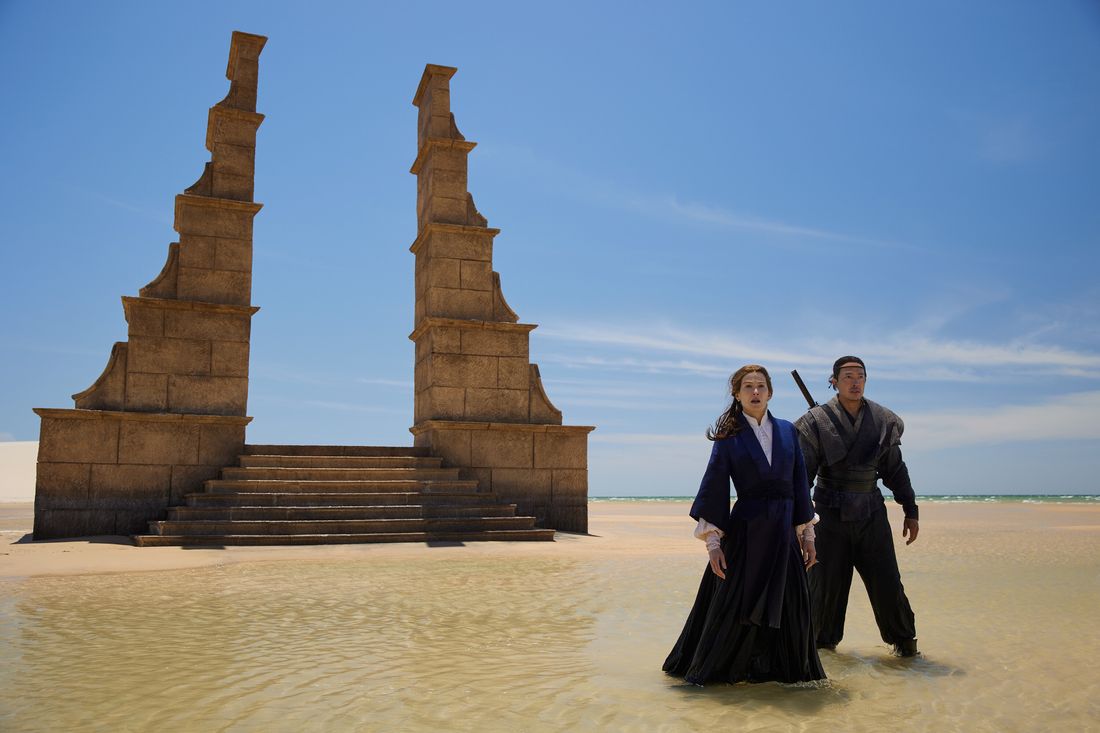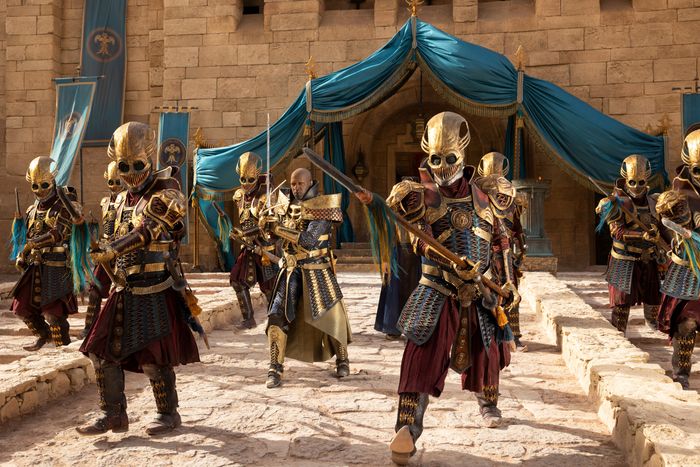
Rafe Judkins, creator and showrunner of The Wheel of Time, is talking about recasting the part of Mat Cauthon, the slyest member of the fantasy epic’s core group of heroes (Dónal Finn took over the role from departing actor Barney Harris this season): “People were like, ‘Should we do some fantasy thing where his face changes?’ No. He is Mat. I commit to that 100 percent, and Dónal, the actor, commits to it 100 percent. If we both do that, nothing else matters.”
Sure enough, Finn aces the role, one of many things that had to go right for The Wheel of Time’s second outing — and did. Leaning into the strangest and most challenging aspects of author Robert Jordan’s massive series of source novels, it’s a sophomore surprise on par with the second-season upticks in quality previously seen on shows like Billions, Halt and Catch Fire, The Leftovers, and, just this year, Foundation. And the secret to that success seems to have been the full commitment Judkins speaks of in our conversation about the decisions behind this breakout season. From the introduction of the sinister and sexually charged villain Lanfear (Natasha O’Keeffe), to the extreme alienness (and American-ness) of the season’s army of antagonists, to the intense enslavement and abuse story line centered on the magic-wielding Egwene (Madeleine Madden), Wheel went hard.
When you adapt a series with the size and scope of The Wheel of Time, it’s a constant process of deciding what to keep, what to cut, and what to change. Is there a big-picture philosophy behind how you make these decisions?
Since the very first day I started on this project, the idea was adapting the whole series of books, not the individual books. There are some books that lend themselves extraordinarily well to television adaptation. Game of Thrones does. You read it as a television writer and you’re just like, “Oh, there’s the act out, there’s the episode for that character.”
The Wheel of Time is really written like a novel. You have a vast web of interweaving moments and characters, and it’s 15 books, so the volume is so huge that it’s impossible to tackle in a modern television series. I love the books, and I was like, “We need to approach it as a whole series.”
So for instance, in this season we’re kind of loosely adapting books two and three. The Forsaken, Ishamael and Lanfear, are both in them, but they’re more these entities that pop in and say nefarious things and provide this scare factor for the main characters. But as you go through the whole book series, you realize these are the human faces of evil. They made the decision to be part of the Shadow for their own very human reasons, and they have so much depth to them.
Right. Lanfear really cares about Rand, and Ishamael’s whole idea is that life is suffering and he’s trying to put an end to that suffering for good.
You can totally understand them. So in adapting the whole series, I felt it was really important to show all this when you’re meeting them. I mean, we’re showing stuff about these characters from books 11 and 12, because it lets you understand them. We wanted you to hear Lanfear and Ishamael talk about why they do what they do and be like, “I kind of get it. It makes sense.” If we can do that, then you start to believe there’s a real chance that Rand could make that choice, too.
Speaking of Lanfear, did you have any idea that she was going to get this kind of reaction from viewers?
Yes, we have been stanning Lanfear since the writers’ room; there’s one writer in particular who would do her best Lanfear all over the room. As soon as Natasha O’Keeffe got to Prague and started playing the character, everyone could tell that something really special was happening. On set, we use the drag-queen dial. I’ll be like, “You’re kind of like 80 percent drag queen in this scene right now, and we need you dialed down to a 70.” That’s the shorthand we use for Lanfear.
But Natasha can deliver all of the layers of Lanfear at once. “You’re in bed talking about your past relationships, but you were actually in love with him 3,000 years ago and he broke up with you, and that’s why you joined the Dark, so you’ve always hated him, but you still love him.” She could do all that and make it feel simple.
The Seanchan are the big antagonists for this season, and from their costumes and uniforms to their hair and makeup to their American accents, they feel like a wholly unique and alien culture.
Getting the Seanchan right was one of the most important things for the show to work. A lot of the stuff in book one treads the same ground as The Lord of the Rings — classic fantasy. Then the Seanchan come in in book two and really sideswipe the entire story. You’re not set up for some random culture to suddenly come in like conquistadors from a different land and start to drive every story in the book. Even today, 30 years after it was written, they feel unlike anything else in fantasy, and we had to achieve that.
The American accents were the final piece of it. I’d always said I don’t want American accents on the show because they read as modern and disrupt your suspension of disbelief in the fantasy world. So in the books, when Robert Jordan describes them as having a kind of Texan drawl, we’d always been like, “We can’t do that.”
But then I thought, what if? What if they were American? It would feel so foreign in our world, and foreign in fantasy. What we did in working with the actors was work off this clip of Americans during the Civil War era, so the accents still have this strange little texture to them, this sing-song quality that hopefully keeps it from feeling too modern yet still really disruptive to the audience.
Egwene’s story line this season draws from some really fraught stuff. You’re referencing real-world slavery, you’re breaking someone like 1984, and there’s also a BDSM aspect to it. That seems like a difficult balancing act, especially when it has to work as drama too.
That was one of the stories that made me feel like this book series was worth adapting. It does that wonderful thing that the best sci-fi and fantasy can do: tackling things in our world from a slant that lets you see it differently than you would if you’re too close to it.
When we first came to it, I sat down with the No. 2 writer on the show, Justine Juel Gillmer, and we talked to Maddie about the scenes she’d be playing this season. We talked about the context of all these things and what it means to her, especially as an Aboriginal woman from Australia, First Nations. There’s connotations and context to the idea of chains and cells and what this means to a person.
Ultimately, it’s a story about power, and that’s what a lot of our characters are dealing with this season. And it’s a story of Egwene not being a victim — the strength that exists within her can find ways to take good from this insane experience. That was important to us and hopefully pays off by the time you get to the finale.
For all that this is an epic fantasy, that whole story line basically plays out as a two-hander between Madeleine Madden and Xelia Mendes-Jones, who plays her sul’dam trainer.
We were so blessed with these actors who, anything you throw at them, they can do it. “Maddie, this is a giant action-fantasy show, and your big episode is going to be in this cell.” “Okay, got it.” [Laughs]
Since I haven’t read the books, I was stunned to learn that Moiraine’s whole story line this season — getting “stilled,” severing her bond with her warder, Lan — was invented for the show. I guess my only question is, why?
The second book, Moiraine is not in it. She has just one chapter where she and Lan are at that retreat where we start the season with them. They have this really intense conversation where she tries to push him away, and he steadfastly refuses. But you really can’t bench Rosamund Pike for season two of your fantasy show — it’s not great storytelling. [Laughs]
So we tried to take all of the juice that was in this one chapter and expand it out across the season. Strip away everything that makes Moiraine who you think she is — being an Aes Sedai, having the One Power, having her warder — and then who is she? When she puts herself back together at the end of the season, hopefully the audience feels like they’ve gotten to experience the chapters told from her point of view in the books, where you understand who she is at her core.
Moiraine is not an easy person to like by hero standards. The ends very much justify the means for her. And she spends the season being pretty awful to Lan and Rand, two of the other leads.
You’re very used to seeing Gandalf-like characters at the center of these things — these guide characters who are purely good and have very little human pathos. To see inside Moiraine and see that she doesn’t even think she’s the best person for the job, but she’s going to fucking do the job and use everything she has to get it done … I think what she’s willing to sacrifice, it makes her quite heroic, in a way.
If Moiraine is no Gandalf, Rand is no Frodo. He’s the chosen one, he knows it, and he’s insanely overpowered, provided he learns how to use it. It’s like an epic fantasy with Superman as the protagonist, and it’s not something I’m used to.
He is overpowered, to a degree that’s very different from what you often have in these chosen-one stories. “What will the people around him do?” becomes a big question in the series — seeing how the other characters check him, knowing that he’s much more powerful than they are.
One of the best things about the books is that this guy is a sweet farm boy at heart, but he has all the power of the world at his fingertips, and he just has to decide to use it. We tried to do it with that scene where he faces off with Lord Turak and just shreds his little army in one blow. They all drop to their knees, almost like a bow to him, which is a real hint of what’s coming for Rand.


